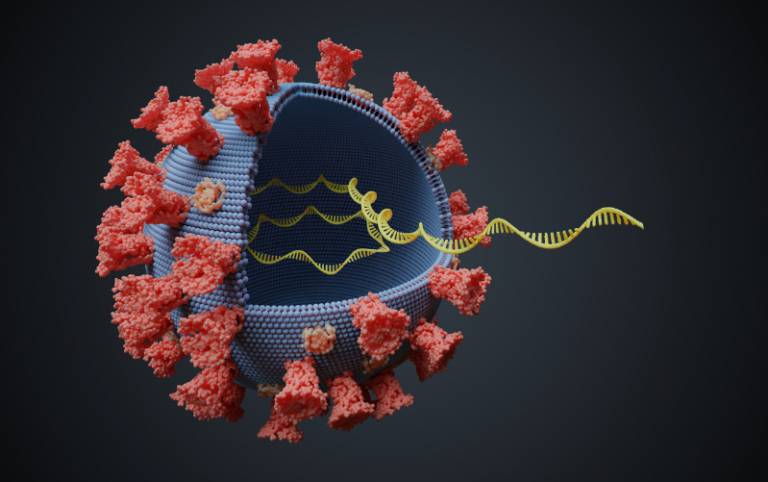How SARS-CoV-2 is changed by antiviral treatments focus of new UCL study
9 December 2021
Scientists at UCL will sequence the DNA of more than 10,000 samples of the SARS-CoV-2 virus to see if or how its genome is changed by different antiviral Covid-19 treatments.

The research is part of the Platform Adaptive trial of NOvel antiviRals for eArly treatMent of covid-19 In the Community (PANORAMIC) study; a first-of-its-kind clinical trial designed to test novel antiviral treatments for use early-on in illness and in those who are at higher risk of complications.
Led by the University of Oxford, the trial is currently recruiting those aged between 18 to 49 with underlying health conditions who have been unwell with Covid-19 for less than five days, and those aged 50 and over. All participants will have recorded a positive PCR test within the past seven days.
Participants will receive either the antiviral treatment Molnupiravir (pill taken at home) plus the current standard care, or the current standard of care without Molnupiravir. Around 5,300 people will be recruited to each group – up to 10,600 volunteers in total will be needed for testing whether this first novel antiviral in the study reduces the need for people to be admitted to hospital.
In the UCL-led virology sub-study, researchers at UCL Pathogen Genomics Unit, UCL Institute of Immunity & Transplantation and UCL Great Ormond Street Institute of Child Health, will carry out rapid sequencing of PANORAMIC virus samples. Scientists say changes to the genome may indicate how a particular antiviral affects SARS-CoV-2’s ability to spread of mutate.
Professor Judy Breuer, Director of UCL’s Pathogen Genomics Unit, said: “We are excited to apply our expertise studying the genomic signatures associated with antiviral drugs to better understand the biology underlying the impact of these new drugs. To be part of this first-of-its-kind antiviral clinical trial for Covid-19 is hugely exciting.”
Dr David Lowe (UCL Institute of Immunity & Transplantation and Consultant Clinical Immunologist at the Royal Free London) said: “This is a really important trial looking at early use of antivirals for Covid-19 in the community, aiming to prevent progression of the disease and hospitalisation. Our UCL-led virology sub-study is key to understanding whether (and how) the drugs will work, including against novel variants such as Omicron.”
Professor Joseph Standing (UCL GOS Institute of Child Health) said: "The importance of the virology sub-study is for us to get a handle on how viral load and changes in viral genome sequence (including new variants and drug induced mutations) along with patient factors such as age and antibody status, correlate with clinical outcomes. This will give us a better idea of how promising new drugs are at an earlier stage in their clinical development."
PANORAMIC has been designed as a ‘platform clinical trial’, meaning it can rapidly evaluate several antiviral treatments over time that could help clinically vulnerable people with COVID-19 recover sooner, prevent the need for hospital admission and so ease the burden on the NHS. The UK Antiviral Taskforce has selected all treatments to be tested.
Supported by the National Institute for Health Research, the trial will bring together GP practices, NHS 111, Test and Trace, Care Homes, pharmacies and other NHS and social care service providers UK-wide who will actively identify potential participants, invite them to take part and support their participation.
PANORAMIC’s Chief Investigator, Professor Chris Butler, Professor of Primary Care in the Nuffield Department of Primary Care Health Sciences, said: "It is early on in the illness, when people are still being cared for in the community, that treatments for Covid-19 could have their greatest benefit. So far, a lot of the research has focussed on finding out if well-known drugs can be repurposed to treat Covid-19. This new trial will test whether exciting, new antiviral treatments that are more specific to Covid-19 help people in the community recover faster and reduce the need for treatment in hospital."
The trial will also assess the effectiveness of the treatments on reducing shedding of the virus, as well as preventing the spread of Covid-19 by offering treatment to some household contacts of participants.
Links
- The PANORAMIC trial
- Professor Judith Breuer’s academic profile
- Professor Joseph Standing’s academic profile
- Dr David Lowe’s academic profile
- UCL Pathogen Genomics Unit
- UCL Institute of Immunity & Transplantation
- UCL Great Ormond Street Institute of Child Health
Image
- 'Virus with RNA molecule inside. Viral genetics concept. 3D rendered illustration'. Credit: iStock/vchal
Media contact
Henry Killworth
Tel: +44 (0) 7881 833274
E: h.killworth [at] ucl.ac.uk
 Close
Close

